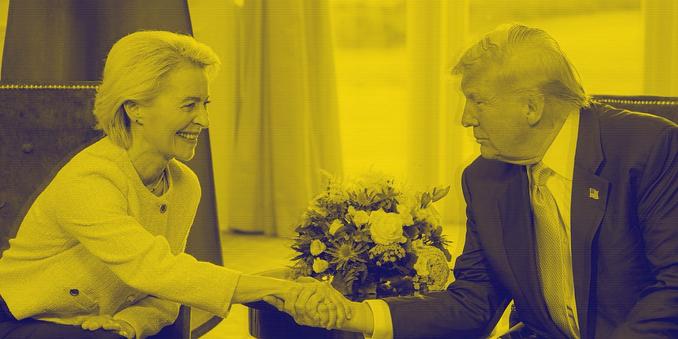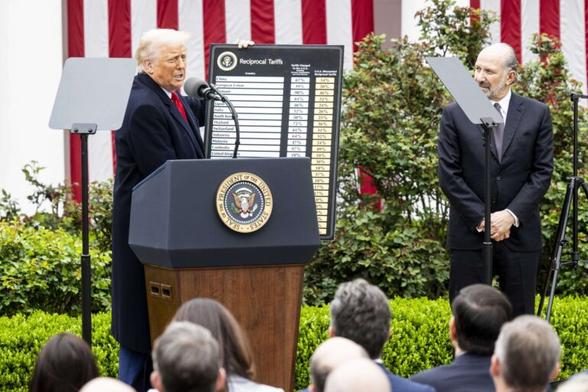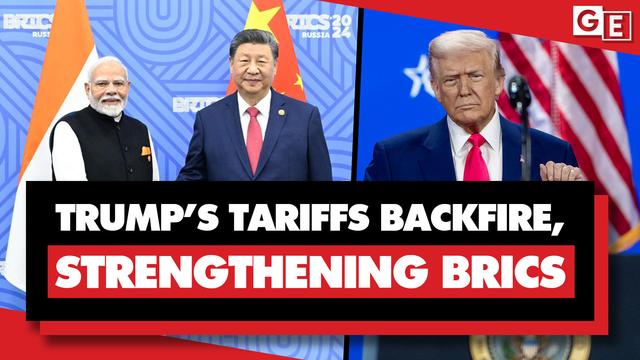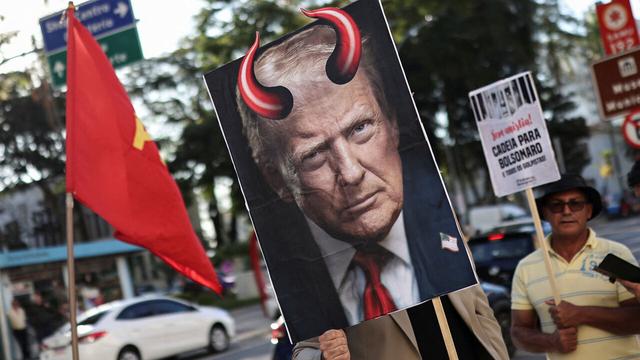https://www.europesays.com/2422870/ Contributor: Why Trump’s economy tossed out the old Republican playbook #approach #deal #DonaldTrump #Economy #EquityStake #exercise #market #past #policy #POTUS #PredictableRule #PresidentDonaldTrump #PresidentOfTheUnitedStates #PresidentTrump #Protectionism #Republicans #resource #StateCapitalism #trump
#protectionism
"Add LEGO to the list of hobbies that Trump has made more expensive and worse with his tariff policy. Thanks to America’s ever shifting trade policies, LEGO has stopped shipping more than 2,500 pieces from its Pick a Brick program to both the United States and Canada.
Pick a Brick allows LEGO fans to buy individual bricks, which is important in the fandom because certain pieces are hard to come by or are crucial to build specific types of creations. LEGO, a Danish company, says that program will no longer be available to Americans and Canadians.
LEGO fansite New Elementary first noticed the change on August 25, four days ahead of the August 29 elimination of the de minimis trade exemption in the US. Many of the individual LEGO bricks in the Pick a Brick collection cost less than a dollar and it’s likely that the the elimination of the de minimis rule, which waived import fees on goods valued less than $800, made the Pick a Brick program untenable."
https://www.404media.co/lego-stops-shipping-individual-bricks-to-united-states-after-trumps-tariffs/

"At this crucial moment, the European Union should reach out its arms to traditional allies like Canada, Australia, Japan, and South Korea rather than turning inward, not to mention working with a broader grouping of countries like Brazil, Chile, and South Africa (just to name a few) to develop a common front against US aggression and, in particular, the colonial nature of its tech monopolists. It’s long past time to implement sweeping restrictions on data collection and transfer, stronger labor protections to end the push to precarity enabled by digital platforms, and stringent regulations targeting the harms of the tech infrastructure developed over the past several decades, including everything from social media to the pervasive surveillance culture that has come along with the business model of Silicon Valley.
Earlier this year, the European Union was floating a much more aggressive retaliatory policy toward the United States. Whereas the trade war is hitting goods, EU officials were explicitly looking at options to target trade in services, with a specific focus on the immense quantity of services it contracts from US tech companies. For companies trying to use the Trump administration to get rid of foreign taxes and regulations, it would have been a major blow. But the European Union backed down and other governments have not tried something similar. They didn’t want to provoke the ire of the White House and Silicon Valley — but they should do just that."
https://www.disconnect.blog/p/world-leaders-must-stop-appeasing

https://www.europesays.com/2365581/ Tariffs Push Canada to Boost Tax Credits for R&D, Clean Energy #ArtificialIntelligence #Canadá #CapitalExpenditures #ClimateChange #EnergyCredits #EnvironmentalTax #InfrastructureFunding #InfrastructureSecurity #mining #NonU.S.Tax #Protectionism #RenewableEnergy #ResearchAndDevelopmentCredits #VehicleEmissions
"Europe has sacrificed the ability to call out his violation of international treaties — such as the World Trade Organization’s requirement of the most-favoured nation principle. It has also fallen in with the idea that results are achieved through personalised bargaining between great men (and occasionally women), rather than the painstaking work of democratic deliberation and consensus building.
But note what these choices have cost Europe. It has shed all the political capital it could have mobilised to lead a coalition of countries in defence of rules-based trade and a concerted opposition to Trump. Not only that, it has betrayed its American friends, who had counted on Europe standing up to Trump while they struggled to do so themselves.
Most importantly, Europe is risking its political soul. It has put itself in a situation in which leaders cannot say publicly what they are actually trying to do. That is a recipe for distrust and a poison for democracy — and European liberal democracy in particular. How can voters endorse policies whose true nature cannot be admitted publicly (such as the promises to Trump not being real)? If the EU hypocritically accepts what economist Richard Baldwin terms the “grievance doctrine” of globalisation, how can it repel anti-European forces thriving on those views at home?"
https://www.ft.com/content/75609ba4-cc61-4556-8ca2-09381da721e9
https://www.europesays.com/2354580/ China says ‘rampant’ US protectionism threatens agricultural ties #AgriculturalCooperation #business #China #Protectionism #tariffs #TradeWar #XieFeng

https://www.europesays.com/2350313/ Trump’s new trade ‘deal’ with the E.U. leaves out beer, wine, booze #alcohol #beer #Europe #EuropeanUnion #FreeMarkets #FreeTrade #Protectionism #tariffs #TrumpAdministration
https://www.europesays.com/2348217/ No, tariffs can’t replace income taxes #business #Consumption #DonaldTrump #economics #FreeTrade #imports #Protectionism #tariffs #taxes #TradeWar #TrumpAdministration

New guidance from U.S. Citizenship and Immigration Services may make pro-Palestine activism a disqualifying factor for non-citizens who seek to live and work in the US.
#Fascism #US #Israel #Protectionism #Genocide #Gaza #Israel #USpol #Palestine
"[I]ronically, Trump’s attacks on BRICS countries have only strengthened BRICS, and encouraged more and more countries to join the Global South-led organization.
Trump has blatantly meddled in the internal affairs of Brazil, the “B” in BRICS. Trump is a close ally of Brazil’s far-right former leader, Jair Bolsonaro. To hurt its current left-wing president, Lula da Silva, Trump imposed 50% tariffs on the South American nation.
This has resulted in Brazil deepening its already close ties with China. And President Lula is publicly calling for BRICS countries to create alternatives to the US dollar.
Trump’s aggression is clearly backfiring.
Another example of this is how the US president has treated India, which is the “I” in BRICS.
For years, the US government has pursued a strategy of trying to ally with India against China, as part of an attempt to divide BRICS and isolate Beijing.
In recent years, especially under right-wing Prime Minister Narendra Modi, India had gradually moved closer to the United States.
But in his second term as president, Trump has attacked India, threatening it with 50% tariffs, one of the highest rates in the world.
Trump apparently thinks that India has no choice but to go along with whatever the US wants. But the world is increasingly multipolar, and New Delhi does have other options.
In response to Trump’s very aggressive tariffs, what did India do? It reached out to China with an olive branch. Now New Delhi and Beijing are improving their relations.
So Trump is actually pushing India and China closer together. This is exactly what Washington has been trying to prevent for well over a decade."
https://geopoliticaleconomy.com/2025/08/16/trump-tariffs-india-china-brics/

"Maybe the craziest part of Trump's "reciprocal" #tariffs is they tend to get HIGHER as countries' tariffs on US exports get LOWER. (Eg, CH got 39% even though its tariffs aver 0.2%).So, we're punishing countries for being open to US goods.
Make it make sense.
The data further demonstrate that US tariffs today are about #protectionism."
It makes sense bc Trump is destroying the USG for #privatization.
#Autocracy #Kleptocracy #Plutocracy #Kakistocracy #Protest #USPol
https://www.cato.org/blog/please-stop-calling-them-reciprocal-tariffs
Trump’s Switzerland tariff could increase America’s trade deficit https://www.byteseu.com/1283374/ #DonaldTrump #Protectionism #Switzerland #tariffs #TrumpAdministration
"The exemptions soften an already light blow. Nearly half of Brazil’s exports to the United States will be spared, estimates TS Lombard, an investment-research firm. As a result, Itaú Unibanco, a Brazilian bank, expects the effective tariff rate to be around 30%. Goldman Sachs has kept its GDP growth forecast for this year unchanged at 2.3%, citing the “notable” exemptions.
Some sectors will feel the pinch. Coffee is among the worst affected. Brazil ships almost half a million tonnes of beans to the United States each year, accounting for 16% of its coffee exports. The effect is already visible: shipments in July were down by a third from a year earlier, as importers delayed orders amid uncertainty. Cecafé, a coffee-producers’ trade body, warned of a “significant” impact on Brazilian roasters and traders. The beef industry will also suffer. Nearly 17% of Brazil’s beef exports went to the United States last year, and shipments have already slumped over the past few months. Fruit exporters—particularly of mangoes, açaí berries and other tropical fruits—face similar disruption.
Yet even these sectors may prove resilient. Brazil has steadily diversified its markets in recent years, and the most affected exports are commodities that can be redirected quite easily. The European Union remains the biggest buyer of Brazilian coffee. Sales to East Asia and the Middle East and North Africa rose by 25% and 61% respectively last year. Trade with China continues to grow. It already buys most of Brazil’s beef and, on August 2nd, approved imports from 183 new Brazilian coffee firms.
Some losses may also be absorbed through state support. Lula’s government has pledged targeted relief, including purchases of surplus stock from affected producers. Finally, there is hope that the tariffs could be eased. Rising prices in the United States could put pressure on the White House to change course."

https://www.europesays.com/2305851/ Australia’s state capture is wrapped up as sovereign capability #austal #australia #glencore #NationalSovereignty #Nyrstar #Protectionism #StarCasino #Trafigura
https://www.europesays.com/2295624/ How a failed Italian bank merger exposed the EU’s struggle to enforce its economic vision – POLITICO ##banking #banks #CapitalMarkets #Catalonia #Competitiveness #courts #Economy #EconomyOfEU #EconomyOfTheEU #EUEconomy #EUTreaties #Europe #Insurance #italy #markets #mergers #PedroSánchez #policy #Protectionism #research #rights #Russia #spain #StrategicAutonomy #UrsulaVonDerLeyen
10% #tariffs on #UK goods, 15% on imported #EU products, 25% on #India 's and even 50% on imports from #Brazil : #Trump 's insane #protectionism means more #inflation in the #USA (fortunately #Powell is still piloting the Fed) and less competitiveness for #American companies in the long run. It just doesn't make sense.
https://www.europesays.com/2285752/ Trump is getting the world economy he wants, but economists remain skeptical #consumers #Economy #EconomyOfEU #EconomyOfEuropeanUnion #EconomyOfTheEU #EconomyOfTheEuropeanUnion #EU #EUEconomy #Europe #japan #Protectionism #tariffs #trade #trump
Trump’s #tariffs are already stunting world growth while markets shrug – US #protectionism is slowing investment and rewiring supply chains at the expense of the global economy, chart @economics https://www.bloomberg.com/news/features/2025-07-27/how-trump-s-tariffs-are-already-stunting-world-economic-growth
https://www.europesays.com/2282133/ On the plight of the unbombed farmers of Eastern Europe – POLITICO #agriculture #AidAndDevelopment #borders #cooperation #défense #enlargement #EU27 #FARMERS #Farms #Protectionism #Russia #security #SingleMarket #trade #TradeAgreements #Ukraine #VladimirPutin #war #WarInUkraine
@randahl
I seriously doubt that #Trump knows what he is doing and more likely playing the cards dealt to him by #Project2025 RWNJs and a push towards #protectionism in an effort to boost domestic production (price controls, jobs, etc..), IMHO
